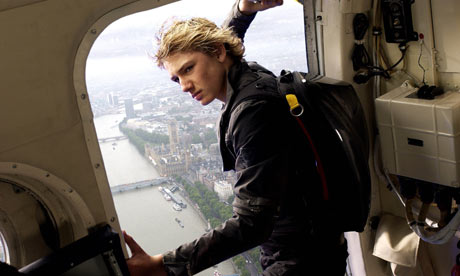
Spy fiction for kids and teenagers remains priority one, with Anthony Horowitz's Alex Rider, Charlie Higson's young James Bond and Robert Muchamore's Cherub series all found in phalanxes in book shops, ready for action in their pimped covers. Covert they ain't – these books tend to be swaggering, metallised and heavy on the bling, making it clear that they're not for girls. Although, in my experience, girls mop them up too when they're not absorbing the wise pink words of Darcy Bussell or practising their crochet.
Spy fiction has a lot to recommend it, especially to harassed "reluctant readers" who want something a bit more down-to-earth than wands and wizardry on their bedside tables, and prefer their protagonists to have dirt under their nails and swear like sergeants when realism demands it. The Cherub series, particularly, is seen and sold as an antidote to prim, sanitised kidfic – books for those tired of reading about posh kids who never go to the toilet. I found the Muchamore books engagingly fast-paced, although there was a gleeful emphasis on bum and balls that occasionally left me gathering my skirts about my affronted ankles. But the whole Cherub setup, featuring a luxuriously appointed spy school for bright, disenfranchised kids, colour-coded identifying T-shirts, and formulaic but enjoyable missions, is closer to the Harry Potter model than you might think.
These books fulfil the same wistful desire – "Make me special" – that magical fantasy does. James, the chief protagonist, orphaned in the first book, is plucked from a wretched situation and plopped into the Cherub training facility, where, to quote the website, he transforms "from a couch potato into a skilled Cherub agent". Horowitz's Alex Rider is also orphaned, losing his guardian in the first pages of Stormbreaker, and is similarly transplanted to SAS special training, where his formidable skills are further refined. In lieu of magical powers, young spies get gadgets that work as if by magic – corrosive spot cream, exploding coins, lock-picks – and get a new context in which to operate, in which they are valued as highly skilled agents rather than powerless children. Parallels with Potter are not hard to draw.
Young spy fic, like fantasy, also tends to pack a strong moral message. Alex Rider doesn't want to be a super-spy – he wants normality, peace, homework and not to have to crack any heads or save the world. The pattering cynicism of adult thrillers is absent from Alex's careful evaluations of what he does and why he does it, giving Horowitz's series additional depth and rounding out his character; he's also devoted to his girlfriend, the splendidly named Sabina Pleasure. Muchamore focuses on ethics, too: in the first book, at least, the rights, wrongs and grey areas of violent environmental campaigners versus big-bucks business are explored quite thoroughly before young James goes in to save the day, getting covered in anthrax in the process. This ethical exploration prevents the best young spy fiction from just being about cool gear and breaking the rules. It forces the reader to ask "What would I do?" and to respond personally to questions with no right or wrong answers.
Of course, if you want the gadgets and the goodies, but prefer the "mwahaha" to the good sport's guffaw, you can always dip into the Hive series and attend the Higher Institute of Villainous Education, where they'll train you as a super-villain, or possibly a henchman. After all, evil geniuses have to start somewhere too.

